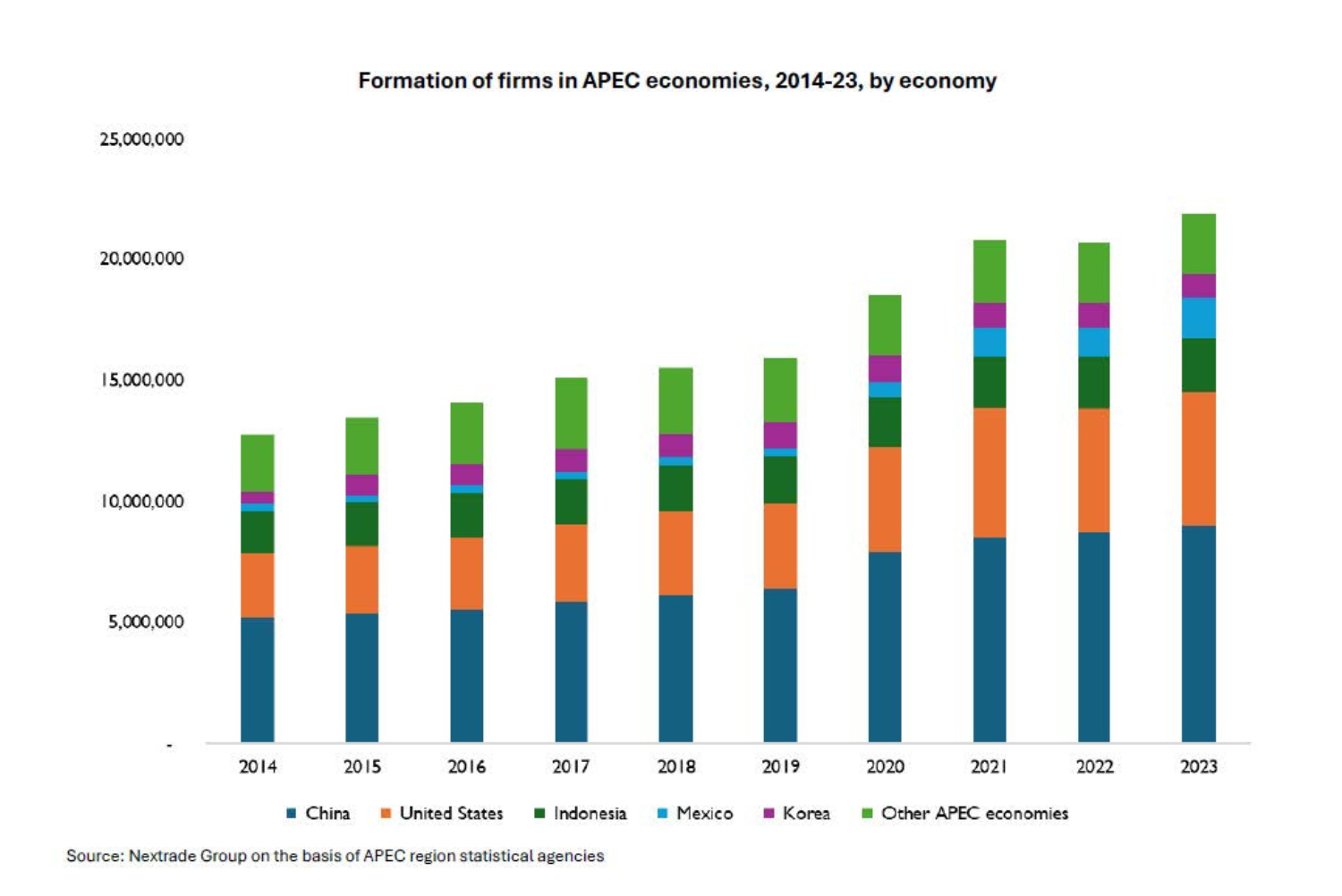Empowering Women Entrepreneurs in APEC: Insights and Pathways Forward

Women entrepreneurs are vital to the pursuit of inclusive growth but remain underrepresented in APEC’s startup ecosystem, facing limited access to funding, mentorship and networks.
Women entrepreneurs are pivotal to the entrepreneurial ecosystem in the APEC region. With innovative ideas, unique perspectives, and a deep understanding of women customer segments, they add immense value to startups. However, their presence in the startup landscape remains underrepresented, particularly in technology-driven sectors. A recent report produced by the APEC Policy Support Unit (PSU) sheds light on this dynamic, providing a comprehensive analysis of the current state of women-led startups and offering actionable recommendations to foster their growth.
Key Findings
Growing the startup ecosystem
Startups—defined as firms three years old or younger—have rapidly grown across APEC economies, with an estimated 169 million new firms established between 2014 and 2023. In 2023 alone, the APEC region had about 59.7 million startups, representing 17 percent of all firms. 
Underrepresentation of women
Private data indicates that fewer than 10 percent of startups in APEC economies are founded or cofounded by women. While some economies have seen notable growth in women-led startups, others continue to lag behind their male-led counterparts.
This glaring disparity highlights deep-rooted systemic barriers, including restricted access to funding, mentorship and professional networks. These challenges are exacerbated by the persistently low representation of women in Science, Technology, Engineering and Mathematics (STEM) fields, which significantly narrows the pipeline of potential founders and co-founders in technology. Compounding these issues is the entrenched societal perception that entrepreneurship, business leadership and ownership are predominantly male domains, further discouraging women from pursuing entrepreneurial ventures and leadership roles in startups.
Data gaps
Sex-disaggregated data on business formation, survival and continuity is scarce across the APEC region. The lack of sex-disaggregated data, particularly on women’s participation in startups as founders and employees, hinders a nuanced understanding of their contributions and the unique challenges they encounter as entrepreneurs.
Recommendations
To bridge these gaps and foster a more inclusive entrepreneurial ecosystem, the report outlines a multi-faceted approach:
Financial access and support programs
Enhancing access to funding is essential for empowering women-led startups. Government grants can provide the resources needed to develop minimum viable products and access critical technologies and talent. Partnerships with financial institutions to offer lower interest rates and awareness campaigns about available financing options can further level the playing field, enabling women entrepreneurs to make informed decisions for business growth. To address challenges in scaling internationally, governments can support trade missions, connect entrepreneurs with foreign buyers, and promote network-building to unlock global opportunities.
Women-led startups remain significantly underrepresented in venture capital funding, often receiving less support than their male counterparts. Initiatives such as women-led investment funds, private investor syndicates, and government-backed programs can help bridge this gap by channeling more capital to women entrepreneurs. Recognizing the diversity of women-led startups, governments must also tailor support to reflect economic and geographic differences. This ensures women in rural or less-developed areas receive resources that address their unique challenges and opportunities.
Early exposure to entrepreneurship and STEM
Encouraging greater participation of women and girls in STEM and entrepreneurship is essential for fostering innovation and economic growth. Integrating entrepreneurship education into school curriculums and providing coaching for young women to take on leadership roles can nurture a new generation of confident female entrepreneurs. Highlighting successful women leaders across various industries also helps break stereotypes, inspiring young women to pursue entrepreneurial ventures.
In STEM, where women remain underrepresented, targeted interventions are needed to close the gender gap. Governments can offer scholarships for women in STEM, ensuring equitable access to education and skill-building. Partnerships between educational institutions and tech companies can provide internships and hands-on experiences, preparing young women for careers in high-demand fields. Addressing systemic barriers and creating leadership pathways can unlock the full potential of women and girls, driving global innovation and economic progress.
Networking and mentorship
Women entrepreneurs highly value networks and mastermind groups that provide support, camaraderie, practical advice, and valuable connections. While many effective networking groups operate within the APEC region, they often lack the capacity to meet the growing demand. Governments can play a pivotal role by partnering with these peer networks to expand their reach and scale proven models, ensuring more women entrepreneurs can benefit from these vital resources.
Collection of sex-disaggregated data
Sex-disaggregated data on business creation, survival and sustainability is scarce across the APEC region. Governments must track key factors affecting women-led startups, including access to finance (such as grants, loans and growth capital), technology, and market opportunities. This data is crucial for identifying gaps and ensuring that policies are effectively supporting women entrepreneurs. Moreover, having access to sex-disaggregated data helps measure the success of women-specific initiatives and enables targeted interventions to foster women’s entrepreneurial success.
Workplace policies and stereotypes
APEC governments should implement supportive workplace policies to promote women’s participation in the workforce and entrepreneurship and in parallel, intensify efforts to counter harmful gender stereotypes and socio-cultural biases. Although the majority of APEC economies have already put in place laws that encourage women’s participation in the workforce, more needs to be done to ensure equal access to credit, along with legal protections such as maternity and parental leaves. These policies, when well-executed, enable women to enter the workforce, advance in their careers, and build successful startups.
At the same time, it remains crucial to challenge societal norms and gender stereotypes that undermine women’s business and leadership capabilities and restrict them to traditional roles. These biases contribute to inequalities in funding and opportunities, hindering women-led businesses. APEC can facilitate the sharing of best practices and impact assessments of these laws to support the continued empowerment of women entrepreneurs.
A collective responsibility
The report underscores the need for collaboration among governments, private entities and international organizations. By pooling resources and sharing best practices, APEC economies can accelerate progress toward gender equity in entrepreneurship.
Women-led startups are not just engines of innovation but also drivers of inclusive economic growth. Empowering them with the appropriate tools, enhanced opportunities, and business-friendly environments is a win for everyone.
***
Rhea Crisologo Hernando is an analyst at the APEC Policy Support Unit.
For more on this topic, download the report Empowering Tomorrow: APEC Women Entrepreneurs in Startups.

